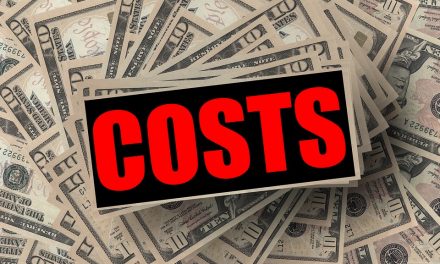Updated March 13, 2021-
After all the political harassment of former President Trump and his tax returns, we can draw several conclusions.
The first two conclusions: 1. Mr. Trump understands the Internal Revenue Service Tax Code. 2. He’s a fabulous salesperson.
While the former president was unsuccessful in persuading the U.S. Supreme Court to shield his tax returns from the Manhattan District Attorney’s Office, the D.A.’s witch hunt has not been successful in its so-called criminal investigation of him.
The D.A. subpoenaed documents from Fortress Investment Management. It loaned Mr. Trump’s company $130 million so he could build his Chicago tower.
Ostensibly, the D.A. is shocked at his prowess in sales and deal-making. Seven years after being granted the loan, he persuaded Fortress Investment Management to forgive $102 million of the loan.
He continues to take advantage of tax write-offs that are permissible for business.
Mud-slinging
In analyzing the mess from the mud-slinging over Donald Trump’s taxes, we can arrive at five other reasonable conclusions.
Of course, I am referring to the controversial publication of Mr. Trump’s 1995 New York state tax return by The New York Times.
The newspaper published his confidential information after a reporter said she found it in her mailbox.
It resulted in the political mudslinging portraying Mr. Trump as a financial predator.
The political reporters either conveniently overlook specifics in the tax code or they simply are too naive and don’t understand the tax code.
The tax code is written so that the government partners with business — either in the sharing of operating profits or in the sharing of operating losses. The government has no basis in which to tax an operating loss.
Five additional conclusions
- The New York Times and its reporter, Susanne Craig, committed a felony — yes, a violation of federal law and risk jail time. The same should be true for the IRS or state employee who violated Mr. Trump’s rights.
- The newspaper showed its continuing political bias
- The newspaper and other news organizations are guilty of gross hypocrisy
- Mr. Trump didn’t avoid paying taxes because he legally didn’t owe any taxes
- The tax code could be simplified
Illegal NY Times’ report – possible jail time?
By violating Mr. Trump’s rights to privacy, The New York Times clearly violated a federal law. Not to mention the New York state or IRS employee who divulged the information to the reporter.
U.S. Code – Title 26 – Subtitle F – Chapter 75 – Subchapter A – Part I – § 7213:
It shall be unlawful for any person to whom any return or return information (as defined in section 6103(b)) is disclosed in a manner unauthorized by this title thereafter willfully to print or publish in any manner not provided by law any such return or return information. Any violation of this paragraph shall be a felony punishable by a fine in any amount not exceeding $5,000, or imprisonment of not more than 5 years, or both, together with the costs of prosecution.
News media’s political bias
In a suspiciously biased fashion, the article concluded Mr. Trump’s $916-million loss might have allowed him to legally avoid paying income taxes for nearly two decades.
The newspaper described Mr. Trump’s filing as receiving “extraordinary tax benefits.”
Worse, the paper disingenuously claimed the so-called benefits were “derived from the financial wreckage he left behind in the early 1990s through mismanagement of three Atlantic City casinos, his ill-fated foray into the airline business and his ill-timed purchase of the Plaza Hotel in Manhattan.”
Clearly, by drawing such a conclusion in such biased language, the newspaper crossed the line of objectivity.
The rest of the news media was largely silent about the newspaper’s illegal report. This bias gives credence to Mr. Trump’s claims about liberal-media bias.
Worse, the media continued to pile on Mr. Trump. For instance, CNN’s headline: Trump running out of time as controversies pile up.
Newspaper’s avoidance of taxes – major hypocrisy
The New York Times has been critical of Mr. Trump and others for the same business practices it uses.
The paper ran an editorial-board Op-Ed ridiculously claiming that businesses that follow the U.S. tax code are unpatriotic.
The Op-Ed also undermines The New York Times’ credibility from its hypocrisy. According to Forbes – The New York Times has avoided paying taxes and has used other dubious practices it deplores.
Trump didn’t owe taxes
Simply put, according to the tax code: If a business loses money, it does not owe taxes.
The tax code also allows if a business loses money one year and makes the same amount of money the next year or in following years it can legally offset the loss.
Why? Such a business has experienced a net operating loss and ultimately the business broke even. That’s how a Mr. Trump can comply with the law.
Simplify Tax code
Mr. Trump has correctly contended that the system is rigged in favor of the wealthy. That includes the complex tax code. It should be simplified.
Lobbyists of all stripes have successfully persuaded members of Congress to legalize countless deductions. Of course, virtually all members of Congress have benefited from the lobbyists campaign donations.
Entrepreneurs have heavy risks and possible great rewards for their efforts. While businesspeople have it rough, they also have the luxury of a sympathetic tax code.
That is unless the person’s business is not profitable and has too many write-offs, which is very painful.
Meantime, Mr. Trump rightfully exercises his rights as a phenomenal business person.
From the Coach’s Corner, related public-policy articles:
Governments – from Cities to Federal – Dangerously in Debt — The U.S. economy has been slowly mending. However, the situation is bleak for governments at all levels.
Why? High debt is dangerous and economic growth is dreadfully slow. This is best illustrated by the enclosed U.S. Debt Clock.
Memo to Candidates, Voters and Media: Think CandidateVerification — For a transparent political process to benefit America –candidates, voters and the news media should investigate a nonprofit – CandidateVerification. The Seattle-area nonprofit – a nonpartisan organization – invites all candidates to participate in a free background check.
“I’m proud to be paying taxes in the United States. The only thing is, I could be just as proud for half the money.”
–Arthur Godfrey
__________






